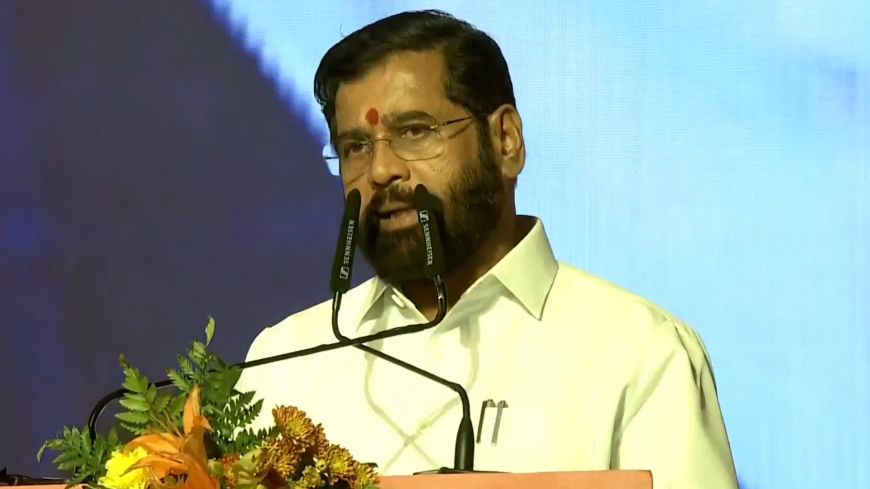“Jai Gujarat” Sparks Storm: Shinde’s Remark Fuels Maharashtra Language Dispute as Singhvi Defends Gandhis in Court
Maharashtra’s Deputy CM Eknath Shinde’s “Jai Gujarat” comment sparks backlash amid growing language tensions. Meanwhile, Singhvi defends Rahul and Sonia Gandhi in ED court case.

Mumbai, July 5, 2025 — Maharashtra finds itself in the eye of a political and cultural storm this week as a seemingly offhand remark by Deputy Chief Minister Eknath Shinde has ignited fierce backlash over the state’s long-running language and identity debate. Shinde, while speaking at a development event in Pune, ended his speech with a loud “Jai Gujarat!”—a slogan traditionally associated with the Gujarati political leadership. The moment triggered sharp criticism from Raj Thackeray, chief of Maharashtra Navnirman Sena (MNS), and other pro-Marathi voices who view the statement as undermining the Marathi linguistic identity.
Simultaneously, in a seemingly unrelated yet politically symbolic development, Senior Advocate Abhishek Manu Singhvi appeared before a Delhi court to defend Rahul Gandhi and Sonia Gandhi in the ongoing money-laundering case filed by the Enforcement Directorate (ED). As these two controversies played out in parallel, the national media found itself torn between two unfolding political dramas that underscore the fragile intersections of language, identity, and power in Indian politics.
Eknath Shinde’s “Jai Gujarat” Comment: A Misstep or Deliberate Signal?
The controversy erupted on July 3, during Shinde’s address at a business conference organized by Gujarat-based investors in Pune. While praising the economic model of Gujarat, Shinde concluded with “Jai Gujarat”—instead of the expected “Jai Maharashtra.” The remark was immediately picked up on social media, prompting outrage from cultural activists, political rivals, and even some within his own support base.
Raj Thackeray was quick to respond:
“We welcome development, but not at the cost of our self-respect. Maharashtra is not a colony of Gujarat.”
The criticism wasn’t limited to political rhetoric. Marathi cultural bodies, teachers' associations, and student unions issued public statements, accusing the Shinde-led government of diluting the state’s linguistic pride in favor of political appeasement.
Historical Context: Why Language Still Matters in Maharashtra
Maharashtra’s identity has long been rooted in Marathi language pride, a sentiment championed by the late Bal Thackeray and upheld by regional parties like Shiv Sena and MNS. Over the years, efforts to prioritize Hindi or accommodate non-Marathi influences have met with consistent resistance, particularly in Mumbai, Pune, and Nashik, where the Marathi middle class forms a vocal constituency.
The Samyukta Maharashtra Movement of the 1950s, which led to the formation of the state itself, was grounded in the linguistic rights of Marathi speakers. In this context, slogans like “Jai Gujarat” are not merely symbolic—they are politically and culturally explosive.
Raj Thackeray’s Resurgence: Rallying Marathi Sentiment
The timing of the controversy couldn’t be more significant. Raj Thackeray, who has recently reunited with Uddhav Thackeray in a broader effort to consolidate the Marathi linguistic vote bank, has found new fuel in Shinde’s misstep. At a packed rally in Mumbai, Raj declared:
“We will not allow Maharashtra’s soil to become a ground for slogans that glorify outsiders while erasing our language, culture, and pride.”
This rhetoric is not just about language. It’s aimed at portraying the Shinde-Fadnavis government as politically compromised and overly aligned with Gujarat-centric economic and political interests, especially given the BJP’s power base in Gujarat.
Meanwhile in Delhi: Singhvi Defends the Gandhis in ED Case
While Maharashtra's streets were abuzz with protests and rallies, courtroom drama unfolded in the capital. Abhishek Manu Singhvi, representing Rahul Gandhi and Sonia Gandhi, made a spirited defense against the Enforcement Directorate’s charges in the National Herald money-laundering case.
The ED has accused the Gandhis of illegally acquiring assets from the now-defunct National Herald newspaper via a company called Young Indian Pvt. Ltd. The case has dragged on for years but gained renewed urgency following the BJP’s recent electoral wins.
Singhvi told the court:
“This is political vendetta masked as legal process. There’s no money trail, no personal gain, and no criminal intent.”
Legal observers say the case is unlikely to see a quick resolution, but the optics—especially with both the Gandhis summoned on the same day—suggest continued pressure on the Congress Party as it attempts to rebuild in the post-2024 political environment.
The Intersection of Language, Law, and Power
Although the Shinde controversy and the Gandhi-ED case may appear disconnected, they both reflect a broader political moment in India. As national parties seek to centralize power, regional identity and judicial independence remain contested terrains.
Political scientist Prof. Sunil Karandikar observes:
“What we’re seeing is the assertion of local identities pushing back against perceived encroachments—be they linguistic, legal, or institutional. These are not isolated incidents but part of a larger narrative of political decentralization.”
What This Means for 2025 State Elections
The twin developments are bound to reverberate in Maharashtra’s upcoming 2025 Assembly elections. For Raj and Uddhav Thackeray, the language row provides an opportunity to reignite Marathi identity politics. For the BJP-Shinde alliance, the challenge will be to repair the perception of cultural detachment and reengage with its core voter base.
Meanwhile, the Congress will watch closely how legal challenges to its top leadership impact its alliance prospects in the state. If Singhvi’s legal defense helps clear the Gandhis, it could reinvigorate the Congress in Maharashtra, where it currently plays a supporting role.
Conclusion
From a three-word slogan in Pune to a high-stakes legal defense in Delhi, this week’s headlines show just how interconnected India’s cultural, legal, and political threads have become. As Eknath Shinde defends his stance and Singhvi defends the Gandhis, the stage is set for a high-decibel political season, where language, loyalty, and law are bound to dominate the narrative.














